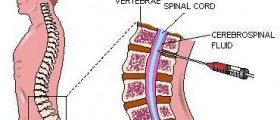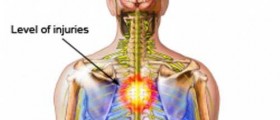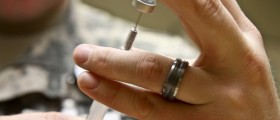Loading...
Experts believe that Guillain-Barré syndrome (GBS) is an autoimmune disorder. Autoimmune disorders happen when the immune system, which usually protects a person by attacking any invading organisms that may harm the body, mistakes the body's own cells for foreign material and begins to attack them. Guillain-Barré can affect people of any age, but it becomes more common with increasing age.
The nerves outside the brain and spinal cord are called the peripheral nerves. They transmit signals from our brain to our muscles telling them to move. They also transmit sensory signals (such as touch, pressure, temperature and pain) from our body to our brain. When GBS causes these nerves to be temporarily damaged, the signals are interrupted. As a result, a person with GBS may have weakness or problems moving, or may feel numbness and tingling in the arms or legs.
GBS is rare, but it can get serious: If the muscles in a person's chest are affected, for example, it may interfere with the ability to breathe and require the person to use a respirator for a while. The good news is that the paralysis that goes with GBS is usually temporary.
What Causes It?
No one knows yet what causes GBS or why it affects some people and not others. GBS is called a syndrome because, like irritable bowel syndrome or other syndromes, doctors diagnose it based on a collection of symptoms.
Although no one knows what causes GBS, scientists do have some theories about the syndrome and why it surfaces in the body. For example, doctors report that more than half of all GBS cases seem to occur after a viral or bacterial infection like a sore throat or diarrhea. Occasionally, minor surgery or something else might trigger the GBS symptoms.
There's no reason to worry that a typical sore throat or a minor surgery is going to trigger an autoimmune response and lead to GBS, though. Colds, sore throats, and the occasional bout of diarrhea are fairly predictable parts of everyone's lives; getting GBS, thankfully, is not.
What Are the Signs and Symptoms?
When GBS does strike, though, it can progress quickly, with the most severe symptoms taking place as soon as 2 weeks after the first signs appear. The first symptoms, such as weakness or tingling in the legs, can show up within a day. These sensations can then spread to the arms and upper body, and the person may feel increasingly tired. Sometimes, the person with GBS also begins to lose his or her reflexes (for example, the person may not have the knee jerk reaction that happens when a doctor tests reflexes).
In the most severe cases of Guillain-Barré syndrome, the symptoms continue to increase until certain muscles become completely paralyzed. At this stage, the paralysis can interfere with breathing or swallowing, so a person usually has to go to the hospital. It can seem frightening, but even at this stage doctors expect most people to recover completely.
How Is Guillain-Barré Syndrome Diagnosed?
As with other medical conditions, doctors rely on a person's medical history and a physical exam to diagnose GBS. If a doctor suspects GBS, he or she will ask some detailed questions, such as whether the symptoms appear on both sides of the body (which is typical with GBS), whether the symptoms happened quickly and got progressively worse, and whether the symptoms started in the feet and legs and spread to the upper body and arms.
Doctors may also do a few tests to confirm that a patient has GBS, including a spinal tap. Two other tests — an electromyogram (EMG) and a nerve conduction velocity (NCV) test — can figure out how well the person's nerves are sending signals down to the arms and legs.
How Is It Treated?
Someone who is diagnosed with GBS is usually hospitalized so doctors and nurses can monitor the person's body functions. Because the way GBS progresses can be unpredictable, some GBS patients are cared for in an intensive care unit (ICU). This allows doctors and nurses to keep an eye on vital signs, such as blood pressure or heart rate, and to step in and keep the person's body functioning until the nervous system can take over again.
In the hospital, a person with GBS might also receive treatment to help speed recovery. One treatment for GBS is plasmapheresis (pronounced: plaz-muh-fuh-ree-sus), where blood is drawn from the body and then processed so that the red and white blood cells are separated from the plasma, the liquid portion of the blood. Then the red and white cells are returned to the body without the plasma. Scientists think that this process helps remove some of the harmful antibodies and seems to reduce the severity and length of GBS symptoms. Another treatment for GBS is immunoglobulin therapy. This involves using healthy antibodies (immunoglobulins) from blood donors to help block the harmful antibodies in the body of the person with GBS.
How long someone with GBS has to stay in the hospital depends on how serious the condition is. Some people's hospital stays last only a few days; other people are hospitalized for several weeks.
Recovering From Guillain-Barré Syndrome
Even after returning home from the hospital, it may take a while before a person feels as good as new. Some people with GBS might need to be in a wheelchair or use a walker until they regain their strength. Many will need physical therapy to get their bodies moving properly again. Recovering from GBS takes patience: Some people may feel some weakness as long as 3 years after having the condition. But the good news is most people do eventually recover from even the most severe cases of GBS.
GBS can be debilitating both physically and mentally. Because it strikes so suddenly and without warning, it can be difficult to deal with and adjust to the recovery period. Doctors may recommend that a person see a counselor or therapist or join a support group as a way to talk through the many confusing feelings that can go with having the syndrome. People recovering from GBS usually have tons of questions, such as "Why me?" and "Will it come back?"
GBS can really impact a person's lifestyle, and it may take a while before people are able to participate fully in their favorite sports or activities. This can feel particularly hard for teens who are usually very active.
For people who have gone through the ordeal of a slow recovery, it's natural to worry that the GBS might come back. Only a very small number of the people who have GBS get it again, though. One reason people worry about the syndrome repeating itself is because people recovering from GBS often notice symptoms that are similar to those they reported when they first had GBS, such as tingling in the hands or feet. In most cases, though, these symptoms are not a sign that the GBS is recurring. They're more likely associated with some lingering nerve trouble after the initial bout of GBS.
As with any medical condition, if you've had GBS and you notice some of the same symptoms coming back, talk to your doctor.
It may take a while before a person who has had GBS is ready to get back to sports and other physical activity, but there's a lot that medical experts can do to help make the road to recovery smoother and faster.
Loading...
Loading...
Loading...
Loading...
Loading...
I will share my story for those that are interested. When I was 18 in the USMC bootcamp, I suffered from several viral infections at once. We call it "recruit crud." These left my extremely weakened. I first noticed my legs were kind of numb, and a bit dysfunctional. Day 2, I was not able to march, and my hands were tingly. Day 3, I was maintaining the same level of inability as far as marching, but now my hands felt like they were always cold; the joints moved slowly and responded less. Day 4 was when things turned bad. I jumped out of my rack and fell on the floor; my legs did not catch me. I could not dress myself, or even stand on my own. Believe me when I say that you do not want to be that person in Marine Corp. boot camp. They sent me to sick bay eventually, and the nurses there sent me to the hospital. The two hour wait for an ambulance resulted in me losing almost all of my functionality. I could only speak, and move the big tow of my left foot (which was really weird).
They started me on IVIG, and my breathing became faulty at that point. Luckily the IVIG was working. I spent the next month in a rehab center with an occupational therapist. After that, I spent 4 months in a wheel chair, and about a year without the ability to write or even type effectively. Today I am sort of normal. I cannot lift more than 100 pounds, I often feel my legs go numb, sometimes I just hurt all over, and it just kind of keeps me bummed.
I got off lucky.
Loading...
Helloa all :) just a quick synopsis on my encounter with GBS, on 14/2/13 I was feeling very lethargic weak in legs no fever or pain, I just wanted to lie down, like a typical sorry for myself bloke, as the hrs passed over that day I felt my ability to swallow get harder and by nite time I was choosing the option to use tissues to wipe spittle away from my mouth, I managed a few hrs sleep but had several toilet breaks that took a lot of effort to get to, as the morning of 15th set in, I realised I didn't really have the ability to take any fluids as it was difficult to stop fluid going down the windpipe, so I never drank more than about half a glass in bits over that morning, and boy was I thirsty, well the day seen me lying on sofa waiting for my lovely missus to come home from work, (she a HDU nurse ironically) when she got home in afternoon to find me feeling sorry for myself, she pushed and pushed for me to see a dr, or at least get a visit, nahhhhhh I said, I'm your standard ex army " I don't need a bloody dr" sad thing is, my male pride was over ruling my profession, because I'm a bleeding paramedic, and I knew I wasn't right!!!! Any how's, to my lovely Katie's disgust I stood by my ignorance, and went to bed, Katie stayed on the sofa bless her, just so I didn't get disturbed, well it was a night I want to forget, as the hrs rolled on I was producing so much secretions from my mouth that I couldn't get fresh tissues fast enough, I felt tingling in my cheeks and at times I was sort of choking on aspirated spittle, I got up at about 0545, so so weak in legs that I had to do stair rest stair rest etc......feeling like I was home after a fourtnight in the Sahara,I knew I needed fluids, but I knew I couldn't swallow, so I lent over the sink and cupped cold water constantly into my mouth that would just run right back out, Katie heard the taps and the splashing and came in and said what are you doing Michael, to which I replied, "shleeeoee pheeernn dheennf," my firkin speech had gone, as I was talking to myself all nite in my mind, I obviously didn't realise what was happening, and paralysis was setting in on my face.....I had a drop to my smile when katie examined me, but on touch both sides of my face were numb,now I was worried, ooooo think I've had a little stroke was running through my mind, the upshot was my mates came and got me in the the ambulance that I was meant to be working on the very next day, consultant on a,e diagnosed gbs quite rapidly, went for ct, blood gasses shown i was hypoxic, and was going downhill fast, anethatist and three doctor came to tell me that I need to go to intensive care unit to be intubated, and globins started asp, I was flattened 10 mins later spinal tap confirmed gbs, woke up several days later to a Trachy inserted and literally unable to move on icu bed, waking nightmare that lasted only a week thank god, I started to get sensation back in face and swallowing reflex was coming back, so I got my wish and they removed the Trachy, and nasal peg, happiest moment of my life, even feeling like death, visit up to high dependency ward for a few nights, then on to a surgical ward, then pulled a few strings and got out of hospital all together, with outpatient follow ups this month with, MRI neurologist etc,,,,,I'm in so much pain in my joints, I'm weak, breathless, but at no point did I get paralysis of legs and arms, just weak, I've also lost the ability to read a lot of small print on thigs now, as I can't focus, mine was from my face to my lungs, more a miller fisher syndrome,I kinda think it was an acute bulbar type paralasys, but it's reported as gbs, all I can say is thank god for gabapentin......I've been so lucky compared to most, but boy aim still suffering still.
Loading...
I WAS PREGNANT AND HAD GBS.I HAD IT 21 YRS AGO AND DOING FINE.NOW I BEEN HAVING BURNING PAINS IN MY LEGS AND FEET.DO YOU THINK IT WILL COME BACK.
Loading...
Loading...
There are mild cases such as my husbands, it's where the immune system attacks the nerves. He has started physical therapy and is going on his 4th week of having this syndrome
